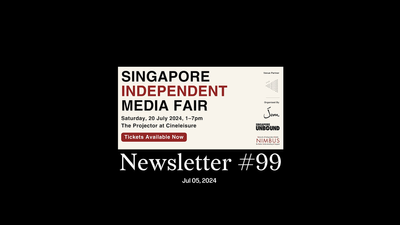Dear reader,
I wanted to share some thoughts on the main talk of the town: the admission by Joseph Schooling that he and fellow swimmer Amanda Lim had sparked up in Hanoi in May, during the SEA Games.
Big deal, many liberals might say. It’s just weed.
Conservatives were shocked. Let’s look at two aspects of their unhappiness.
The first has to do with the “crime” itself. Many here don’t realise that Singapore citizens and permanent residents can be prosecuted for drug consumption overseas, under Section 8A of the Misuse of Drugs Act.
If you are sent for a drug test in Singapore—perhaps when you stumble half-baked through Changi Airport—and then test positive, you “may be dealt with” as if you had consumed the drug in Singapore.
This is actually a form of extra-territorial jurisdiction, in that the long tentacles of the Singapore state can theoretically wrap themselves around you while you’re sitting in an Amsterdam coffeeshop or a Californian dispensary.
Many consider this overreach, even a basic human rights breach. It’s something I was intimately familiar with when I was an undergraduate in California in the early 2000s.
Some Singaporean kids there would experiment with drugs, and then fret a bit about the journey home. Some friends would stop smoking weed two weeks before their flight home to Singapore, and then start drinking litres and litres of cranberry juice every day, in the belief that it would flush their system of any trace. (Something they read on the internet.)
But why so much worry? Well, in the early 2000s, stories were bubbling up that Singapore had started more actively prosecuting people under Section 8A. And this is where I have a bit of sympathy for the government.
According to a friend who then worked at the Causeway, there were more and more cases of Singaporeans driving over to JB, popping pills, and then driving back high. (Ecstasy, whose trips last for hours, had grown in popularity through the 1990s.) Breathalysers wouldn’t catch them and the “offence” was technically committed in Malaysia, a country with, shall we say, much less fussy cops.
And so in order to nab these party-goers with dilated pupils, the Singapore police started conducting more drug tests on returning Singaporeans, and started deploying Section 8A more aggressively.
That’s what I was told, and that, to me, seems like a reasonable application of Section 8A. (Please don’t drive high.)
Fast forward 20 years, and now, thanks to Joe, Singapore is this week again pondering this weird extra-territorial jurisdiction.
It’s especially pertinent in terms of cannabis. Even as many countries around the world, including Malaysia and Thailand, have liberalised their approach towards it, Singapore, led by the swashbuckling Shanmugam, seems to be digging in its heels. Some of the recent scaremongering by Singapore’s Central Narcotics Bureau reminds one of the “Reefer Madness” stuff from the US in the early 1900s.
So while the official climate today in Singapore is still restrictive, even more Singaporeans are sampling weed overseas—one person told me that on company trips to San Francisco their subordinates insist on a first-day dispensary pitstop.
There is a chasm between the antiquated paternalism of Singapore’s older generation and the social norms of its more liberal youth. Perhaps this is what Joe’s toke exposed.
(Of course there are broader, deeper injustices around Singapore’s approach to drugs that we must address, including the systematic execution of vulnerable mules from around the region. Jom will get to that some day.)
In any case, since Joe’s drug test turned up negative, he didn’t actually break any Singaporean law. He won’t, however, be allowed any more disruptions by Mindef, and this speaks to another aspect of conservative unhappiness.
In the never-ending debate about whether elite sportspeople deserve exemptions from National Service (NS), many in the establishment believe that Singapore has done enough for Joe. To them, this incident feels like a slap in the face. Conservatives will probably use it to buttress their case that NS shouldn’t be liberalised for sportspeople.
Moving from Joe to Jom, we’ve got our usual Singapore This Week, which has our thoughts on teachers, 'cancel culture', and an anecdote about a lovely song that was penned in Singapore around August 31st 1957, the day of Malaya’s independence from the British.
We also have two fascinating, timely essays out today.
One is about the seven-month Hungry Ghost festival that has just ended, written by Paul Ng, a contributor. You may have seen the burning of paper around town. It’s a tradition that I’ve never really known much about, partly because it’s sometimes politicised in terms of ethnic privilege. (“How come they can burn their paper but we can’t beat our drums?”)
I’ve also always thought that this tradition would eventually die out with the younger generation, given their greater environmental and resource conservation focus. Yet now, twice in a week, we’re lucky to hear about how young Singaporeans are reimagining this tradition: Salty Xi Jie Ng last week, and today, Paul. I’m so grateful that he has allowed us into this intimate space that he shares with his mum.
Our other piece, part of Jom’s ongoing National Day series, is on Singapore’s obsession with the traditional nuclear family. It’s written by Jean Hew, Jom’s head of research. It’s an issue I’ve known a little bit about, having grown up in the 1990s with “Asian values’” relativism drummed into me, so it was great to learn more about the actual Confucian influences and PAP history around this. Her piece has made me think a bit more about the relationship between family and country.
Jean is our first employee and a Gen Z who addz 'Z' to the endz of everything(z). She is also a music geek, budding baker and chef, and our resident philosopher with a particular interest in feminism and sexuality. It’s still not clear to me if she’s gonna be better suited to one day lead Jom’s music podcast, culinary TikTok channel, or live talkshow on feminism.
That anxious energy of having so many options in your mid-20s! I hope that Jean—and Joe—continue to explore theirs.
Best wishes,
Sudhir Vadaketh
Editor-in-chief, Jom
If you've enjoyed our newsletter, please scroll to the bottom of this page to sign up to receive them direct in your inbox.






